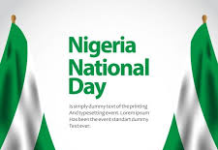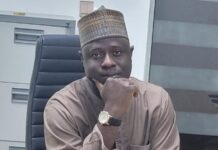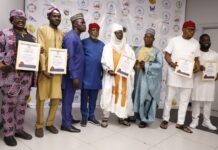From Thief-taker to Gatekeeper and Beyond: “The Loneliness of the Long-Distance Runner”
By Ahmed Yahaya-Joe
Against the background of the arrest and ongoing prosecution of former CBN governor, Godwin Emefiele many pundits have been positing that a Buhari-Tinubu clash is inevitable.
Utter balderdash.
No such would happen because Nigerian politics is firmly pivoted on elite circulation. A high-stakes game of musical chairs.
Recall ahead of the 2011 presidential election how the alliance talks between CPC and ACN irretrievably broke down.
Hear Asiwaju Bola Tinubu back then on his dalliance with the PDP behemoth, “When Jonathan’s overture came, I brought in my team and we gave him the conditions under which we would not actively oppose him but we would never openly support him.”
Our political titans may have their superficial differences but none are fundamental enough to make them commit class suicide.
Two scions of Ribadu have risen to political prominence in our nation both, “bold, controversial, assertive, brilliant and even domineering.”
First, was Alhaji Muhammadu Ribadu (1909-1965) the first post-independence minister of Defence who completed the Nigerianization of the Army in 1965 vehemently rooting for Brigadier (later Major General) Johnson Thomas Umunnakwe Aguiyi-Ironsi, NA 3 to be the first indigenous General Officer Commanding the Nigerian Army as opposed to the British choice of Brigadier Babafemi Ogundipe, NA 6 and Sir Ahmadu Bello’s preferred candidate, Brigadier Samuel Adesupo Ademulegun, NA 4 irrespective of the choice of the First Republic Prime Minister, Brigadier Zakariya Abubakar Hassan Maimalari, NA 8.
See details in A Right Honourable Gentleman: The Life and Times of Alhaji Sir Abubakar Tafawa Balewa (1991) by Trevor Clark
The grandfather of Nigeria’s future First Lady Aisha Buhari was a man of bullet point words, “As long as I remain defence minister, my soldiers would marry the prettiest women, live in the best homes, eat the best food and drive the best cars because when war comes they die first.”
Second is Malam Nuhu Ribadu, a retired Assistant Inspector-General of the Nigeria Police currently National Security Adviser (NSA) and pioneer anti-corruption helmsman at EFCC, 2003-2007 having prior served as DPO at Ajegunle, Mushin and Apapa in the 1990s.
Ribadu, their historic hometown from which they derive their surnames is a rustic outlay of rural aristocrats, nomadic herds men and sedentary farmers in present-day Fufore Local Government Area – the largest and most populous in Adamawa State.
Home to the Fulani including the autochthonous Gengle, Koma, Kugama, Kumba, Mboi, Mumuye, Verre and Bata ethnicities. River Benue gets its name from “Binuwe” – meaning “Mother of waters” in the Bata language.
After the British conquest and occupation of Yola on September 2, 1901 then Lamido Fombina (Lord of the Southlands) Zubayru bin Adama (d. 1903) reportedly fled to Ribadu. In hot pursuit, Colonel (later General) T.N.L. Morland of the West African Frontier Force used Maxim guns to level to the ground Ribadu that was briefly the capital of Fombina (Adamawa) Emirate in the 1830s before the present Yola location was occupied in 1841. The Sandhurst commissioned officer would subsequently on February 3 and March 15 1903 command the conquest of Kano and Sokoto respectively.
Adamawa with the Hausa suffix – “wa” is derived from the name of its founder, Adama bii Ardo Hassan (1786-1847) who is qualified with the honorific, Modibbo – meaning “the learned one” in Fulfulde. Beyond the present-day Adamawa State and swaths of Taraba State, Fombina encompassed most of northern Cameroon and parts of Central African Republic.
Of the 21 LGAs in the Adamawa axis of the former Gongola State, 9 including Fufore bestride the 712 km long international border between Nigeria and Cameroon. In comparison, the distance between Lagos to Calabar by road is 744 km.
“Every society gets the kind of criminal it deserves. What is equally true is that every community gets the kind of law enforcement it insists upon.” – Robert Francis Kennedy (1925-1968) US Attorney-General, 1961-64
If so, what kind of law enforcement should Nigerians insist upon under President Tinubu?
Certainly, the type that ensures we have a more secured nation. By appointing a former policeman to a position consistently held by retired generals since 1999, Mr. President is perhaps sending a loud and clear message that it will no longer be business as usual with embedded fifth columnists in Nigeria’s security architecture and military establishment.
Widespread reports of endemic corruption are too numerous to ignore or dismiss as negative profiling. Despite modest achievements professionalism has been apparently undermined for so long.
The thief-taker was, “a private individual hired to capture criminals,” forerunner of today’s police in England with their crest-type custodian helmets a replica of which Malam Nuhu displayed on his desk as EFCC helmsman. The optics intended was obvious. Bobbies, as British policemen are nicknamed are not only sticklers for their job but hardcore professionals.
The following excerpts from Power of Powers: A Biography of the Late Alhaji Muhammadu Ribadu written by Sidi H. Ali and published in 1974 have been repeated many times over the ensuing decades. The details contained in page 15 deserve another re-run;
“He was acting prime minister while Sir Abubakar (Tafawa Balewa) was out of Lagos. He was also acting minister of finance at the same time and holding his own substantive office as minister of defence. Then the question of purchasing a new office for the ministry of defence came up. He negotiated and purchased the place.
He then wrote:
“As minister of defence, I have bought the new office. As minister of finance, I have approved the purchase, and as prime minister, I have no objection.””
Read Also:
Similarly, the younger Ribadu during his time under former President Obasanjo was such a bamboozling power broker;
“One day during lunch break during a FEC session, I sat with the president, and we began to chat. In the course of our discussion, the president told me how he was endorsed by Obasanjo, before asking, “Do you know your friend Nuhu singlehandedly stopped Dr. Peter Odili from being my running mate?” he asked rhetorically. “Such was the power he had over Baba (Obasanjo) that whatever he said was law.””
See details in Power, Politics & Death: A Front-row account of Nigeria under the late President Yar’adua by Olusegun Adeniyi p.30
Ahmadu Ribadu College is a high-brow secondary school located in Yola named after Ambassador Ahmadu Ribadu, the father of the NSA who passed away at 79 in 2003.
Opened in 2000 by the late President Shehu Shagari with the motto: “A Janga a moda” and established by Hajiya Zainab, widow to the Dr. Mahmud Muhammad Tukur (1939-2021) who was a prolific scholar also reputed to be the lead ideologue of the increasingly extinct Kaduna Mafia.
Shehu Othman describes the purpose the group in Classes, Crises and Coup: The Demise of Shagari’s Regime (Oct., 1984) thus, “ostensibly the promotion and defence of Northern interests, politically, economically, religiously and even socially.”
The relationship between the late Dr. Mahmud Tukur and Malam Mamman Daura, Nigeria’s erstwhile First Nephew does not need much elaboration here.
Both first met as young school leavers at Kano in 1958 alongside 4 others personally selected by Sir Ahmadu Bello from various secondary schools across the former Northern Region preparatory to proceed for further studies in “liberal education” at the United Kingdom.
The aforementioned duo was chiefly responsible for the onerous drafting of former President Buhari into the political fray in the first instance ahead of the 2003 presidential election under the banner of the now rested APP later ANPP.
It was therefore not surprising back in 2021, Asiwaju Bola Tinubu’s published tribute on the demise of Dr. Tukur concluded, “My deepest sympathies go to President Buhari, First Lady Aisha Buhari and Malam Mamman Daura.”
What is the political implication of the recent enunciation by the NSA, “We have inherited a very difficult situation, literally a bankrupt country”?
It is a sharp double-edged sword that is what.
On one side it is reminiscent of former President Buhari’s own words in his nationwide address on October 1 2019, “This administration inherited a skewed economy.”
A back to sender of sorts on behalf of former President Jonathan under whose watch the NSA not only returned back to Nigeria from the self-exile that he was virtually forced into under Yar’adua but had his rank of Assistant Inspector-General restored after his demotion to Deputy Commissioner by administration of the late president.
The background was that Malam Nuhu is characteristically a no-holds barred individual no matter whose ox is gored as Olusegun Adeniyi further recounts in his 2011 book;
“Once it became obvious that he (Yar’adua) had been anointed by Obasanjo as successor, an incensed Ribadu, who had been rooting for the then FCT minister, Mr. Nasir el-Rufai, reacted badly.
Aside from meeting Obasanjo to express his disappointment, Ribadu badly managed a latter session he had with Yar’adua, to put the account mildly. He dismissed Yar’adua to his face, saying he was unqualified for the office of the president. It was an insult Yar’adua never forgot. Nor forgave.”
Meanwhile, on the other side it is perhaps an elaborate gesture of loyalty by a long-distance runner willing to temporarily hurt his extended family constituency for the overall good of power shift when the time eventually comes. No show of loyalty is perhaps greater than that of a soldier willing to fall on his sword on behalf of his general.
Despite President Tinubu and his NSA having politically come a long way, “When expectations go up and realities go down, men rebel.” – Ted Robert Gurr (1936-2017)
What were the alliance pre-conditions given to former President Jonathan by Asiwaju ahead of the 2011 presidential election?
Although Mr. President insisted to Olusegun Adeniyi in page 47 of Against the Run of Play, “There is no question of money or other personal benefit to me directly,” the paradox was that Nuhu Ribadu was flying the ACN flag in the same contest.
Anyway, after Jonathan had successfully renewed his tenancy at the Villa he compensated Ribadu with chairman, Petroleum Special Revenue Task Force but Asiwaju was charged at the Code of Conduct Tribunal instead.
Perhaps why Bisi Akande in 559-page memoirs entitled My Participations puts it that, “Tinubu is a difficult personality; very complicated for me to classify. He revels in controversies but constantly suppresses attendant difficult pains of disappointments and betrayals by consuming cups of strong expresso (coffee) and chains of cigarettes.”
But why did Jonathan also compensate another opposition element from the CPC stables with NSA?
It is because elite circulation connotes, “Changes of regime occur not when rulers are overthrown from below, but when one elite replaces another. The role of ordinary people in such transformation is not that of initiators or principal actors, but as followers and supporters of one elite or another.” – Vilfredo Pareto (1848-1923)
According to Chief Bisi a certified Man Friday of President Tinubu, “The efforts of the former National Security Adviser – Colonel Sambo Dasuki is worth mentioning in this political bridge-building attempt between ACN and CPC.
He was always coming around, begging us, to support Buhari’s presidential aspiration. Nuhu Ribadu, whom we had earlier chosen as our presidential candidate in the ACN, said he was ready to step down for Buhari.”
In conclusion, “The Loneliness of the Long-Distance Runner” is the title of a 1959 book written by Alan Sillitoe featuring a protagonist who in his own way is like the Nuhu Ribadu we know, “bold, controversial, assertive, brilliant and even domineering.”
Yours truly added “and beyond” to Malam Nuhu’s thief-taker antecedents and his current security gatekeeping schedule as prognosis.
Read my lips, Nuhu Ribadu is a well-suited power shift exit strategy for President Tinubu. If that political eventuality plays out the long distance-runner from Fufore should be rest assured he quite certainly has my vote;
“The future starts today, not tomorrow.” – Pope John Paul II (1920-2005)

















